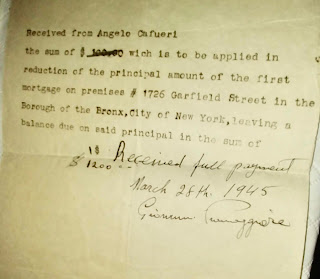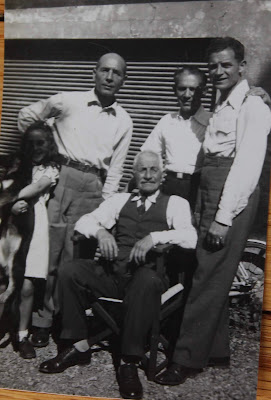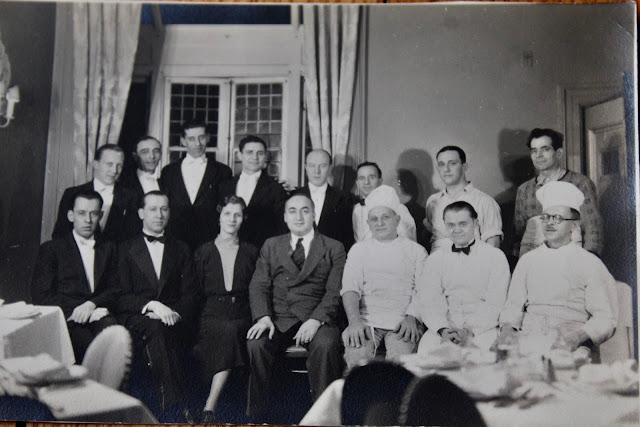“Two years ago, this shy little miss came to us directly from Italy. She seemed to fit right in, and has distinguished her stay in Classical High School by her good scholarship. We who are acquainted with know her as an excellent little friend, always ready to give any help she can when it is asked for, yet too shy to intrude. Anna says she likes America, and our school very much but some day hopes to return to her beloved native Italy.” So says Nonni’s high school yearbook, and it sounds about right. I said as much at her wake in 2007
“Never too high or low, Nonni was content and always seemed at peace with her surroundings. But that’s not to say that Anna Ancora had an empty head.
Nonni was the youngest of seven and came to the United States in 1925. Reunited with her father in Providence, she spoke Italian, French, Greek and Latin. Unfortunately, Nonni knew no English, and continuing her education might have seemed tenuous.
She was initially enrolled at a nearby junior high school, but the principal felt the school wasn’t right for Nonni. They conversed in French, and he recommended Classical High School.
Founded in 1843, the school’s motto is “To Strive, to Seek, to Find, and Not to Yield,” and Nonni was speaking fluent English within six months.
Nonetheless, things went well for the Ancora family at first. Her father (Bellasario) made a living as a tailor and played his music in accompaniment with movie houses. There was a lot of family and friends, and Nonni used to spend time on her cousin’s farm, where they grew corn and raised cows. In fact, the Pucino’s acreage was converted during WWIIand housed soldiers.
Nonni also had many girlfriends and was accepted to Pembroke College. But the depression permanently detoured her life. Bellasario lost his job and could not afford the $600 yearly tuition in 1929.
Sulking or not, Nonni didn’t just sit on her smarts. She learned shorthand and typing and got an office job.
Her spirits didn’t diminish either, and she continued to socialize with family and friends. One such occasion had her meeting my grandfather, where they had a common friend.
A four year long distance relationship flowered, and the couple eloped to New York City in 1932. They settled in Manhattan, where Angelo Cafueri was a waiter at Giovanni’s on East 55th Street.
Nonni became good friends with Giovanni and his family, while Ada was born in 1933 and Lita in 1937. Of course, the depression made life hard. Nonni would walk long distances to pay five cents for bread and beans, and homemade macaroni was frequently on the menu.
There weren’t a lot of trips to Neiman Marcus either. Macy’s was a destination, though. Nonni would purchase fabric, and the fashionable clothes she made with her mother, clothed the girls into young adulthood.
Better times did come, and Nonni still got out to Rhode Island. Nonno would stay behind and Nonni often spent the summer with her daughters. The trio stayed with an old friend named Grace, but they narrowly escaped tragedy.
Piedro Glasso was another old Providence friend, who suggested that it was getting cold and time to head back to NY. So he came by, packed the Cafueri’s up and summer vacation was over. A week later on September 21, The Great 1938 Hurricane hit. 400 people were killed, and Grace was washed away with her home.
Life going on, Nonni’s dressmaking skills eventually turned into a profession. On Union Port Road, Nonni worked at a small shop that made women’s suits and coats for Lord and Taylor.
Beyond 9-5, Nonni played Bingo at St Dominic’s, attended the Opera and Radio City Music Hall and liked going to the movies. Otherwise, the family used went to South Beach on Staten Island, and she enjoyed swimming.
But like her husband, Nonni took time to come around in terms of her future son-in-law. Rather than a high school educated “Elevator Boy, she hoped her daughter would meet someone at college.
They warmed up to Charlie Monetti when Lita took the apartment upstairs with her husband David. My father would often come around to meet up with his good friend, and by the time the Monetti’s got married, Nonni took the coupling in stride - just as she always had with everything.

































